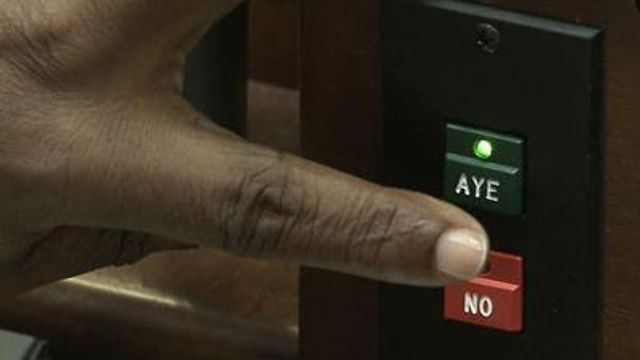Budget deal: Some money for schools, none for eugenics victims
Leaders at the North Carolina legislature outlined their budget deal, which includes raises for public school teachers and workers but omits payments for victims of the state's old forced sterilization program.
Posted — UpdatedLawmakers haven't released copies of the budget to the public, but Berger and Tillis said that it included a 1.2 percent raise for state employees and public school teachers.
The new budget plan will take effect July 1 if it becomes law.
Republicans control both the House and Senate, but the two chambers created very different budget proposals. The compromise plan represents a merger of those two proposals.
Both Tillis and Berger said they hoped Gov. Beverly Perdue, a Democrat, would sign off on the plan rather than veto it. But Perdue has insisted for months that a tax increase was needed to augment education spending, something Republicans were unwilling to do.
Two high-profile items sought by House leaders were not included: funding for eugenics victims and language creating a tax credit for companies that fund private school tuition programs for low-income students.
"There was no ability to develop consensus on one particular path forward," Berger said of the eugenics bill.
While the House had passed a package that would give $50,000 to each victim of North Carolina's state-sponsored sterilization program from the early and mid-20th century, Senators balked.
Tillis characterized the lack of eugenics funding as "a personal failure" but said the Senate simply wouldn't budge on the issue.
Rep. Earline Parmon, D-Forsyth, said not including payment in the final budget is a betrayal.
"This year, we said that we would do something, that we would pass this compensation bill. We lied to the people of North Carolina who were victimized by us," Parmon said.
The Justice for Sterilization Victims Foundation, which has verified 146 and 15 deceased victims of the eugenics program in 57 counties statewide, said it immediately suspended requests to verify other victims. Foundation executive director Charmaine Fuller Cooper said the panel's funding ends on June 30 since the budget includes no new money for it.
As for the scholarship program, Tillis said the issue was still alive and might be handled in a separate bill.
The Senate is expected to vote on the budget Thursday. A House vote will be scheduled for Friday unless all the members of the chamber agree to waive a House rule to allow for a Thursday vote.
Specific items in the budget as detailed by Berger, Tillis and other budget writers include:
- A 1.2 percent raise for teachers and state workers. The Senate version of the budget would have allowed schools to use money for raises to offset other cuts to education funding. The compromise plan, Berger said, adjusts the salary schedule. Retirees in the state pension plan are also slated for a cost-of-living increase.
- A $251 million boost to education funding. This money helps roll back "flexibility cuts" to schools, money that public school systems have to hand back to the state government every year. The $251 million roughly compensates for the loss of federal EduJobs money that expires this summer. However, schools will still see roughly $82 million less in overall state and federal funding.
Representatives of teachers and state workers gave the plan tepid approval.
"Bottom line is, this is a step in the right direction from where we were about to go," said Brian Lewis, government affairs director of the North Carolina Association of Educators.
Ardis Watkins, legislative affairs director for the State Employees Association of North Carolina, said state workers and retirees haven't had a raise in four years.
"(It) is not as much as we would like to see," Watkins said of the 1.2 percent raise, "but the Senate took a step in the right direction, and we're glad to see the end result."
• Credits
Copyright 2024 by Capitol Broadcasting Company. All rights reserved. This material may not be published, broadcast, rewritten or redistributed.






